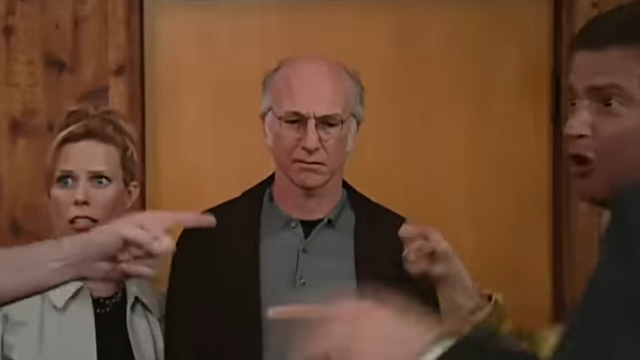Seinfeld was a big influence on It’s Always Sunny In Philadelphia, and one observation I have often seen – framed as both a criticism and neutral point of comparison – is that the characters of Always Sunny are always going to do the most malicious, stupid, and evil thing whilst the characters of Seinfeld are more flexible, just as often trying to do right by someone or give out charity as they are being selfish (this is also a reason I’ve seen given – including by beloved Soluter Ruck Colchez – as to why they don’t really deserve the events of the finale). Larry David choosing the center the show around his fictionalised self feels like it accentuates this element, to the point that I don’t think there’s a better fictional representation of moral neutrality than Larry David (character).
In the second season, characters have started pointing out how many rules and terms Larry makes up expecting other people to already know and understand them – one of the major ones is the stop-and-chat – and it speaks to what a lot of David’s work has been about and why so many people (including myself) can identify with it. Larry is operating under the dual assumptions that a) life is supposed to make sense and b) everything should be good for him everywhere and all the time. The latter drives him to whine, to steal, and to fight; the former drives him to apologise and work to make amends, like his parties for his wife and trying to help her family even when he doesn’t care for them.
Arbitrary traditions are what make civilisation. Larry isn’t really interested in being a good person, he just wants everything to be square; I obviously find it hilarious when he loses his temper or does something he intends to get away with, but I also find him sympathetic when he admits to being at fault afterwards and tries to make up for it. I find it fascinating that he doesn’t seem to give much of a shit about face – he doesn’t seem to base any decisions on people thinking he’s a good person (even if he feels a little resentful about being seen as rich), instead he’s more concerned about anything that makes him feel better. I think most people are like that.
(This is why the scene in the final episode where he tries seducing his wife to distract her comes off so godawful, and is hopefully the worst one in the show. It was when Larry brings up that, like George, he ate an éclair out of the trash that I was fully horrorstruck to realise how much of Seinfeld and therefore Curb was taken from the real David, and I hope he didn’t nearly rape his actual wife.)
This is where the Judaism is an interesting aspect of the series – Larry reflects some actual Jewish people I’ve known who are apathetic towards the spirituality of their religion but deeply invested in the community. I have often found the most #relatable stories tend to come from cultural practices deeply different from my own, where I recognise patterns relevant to my own life expressed in very different ways. I’ve never been to a baptism, but Larry’s irritation with the cross-cultural conundrum rang very true to my exasperation with similar situations.


